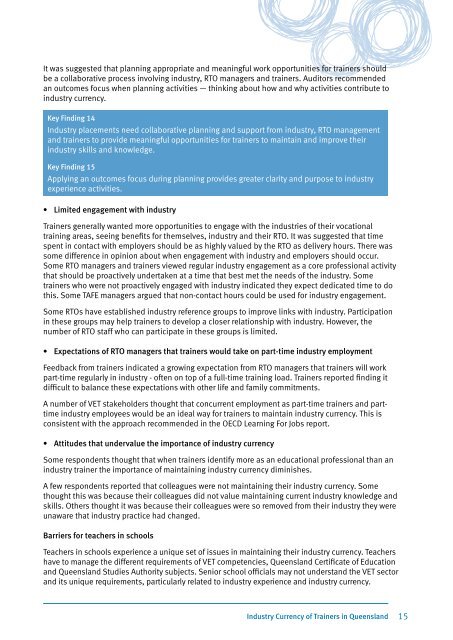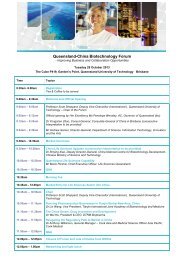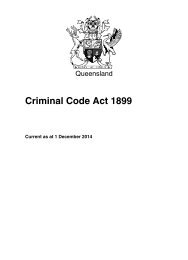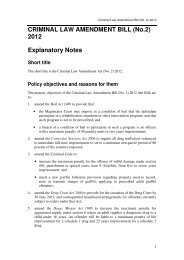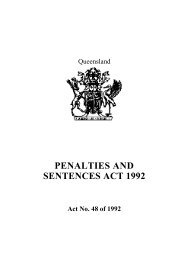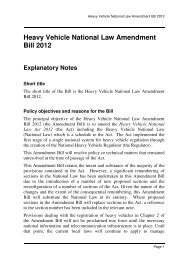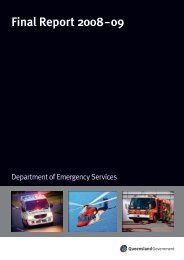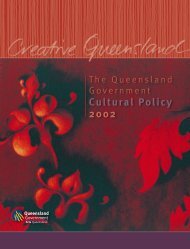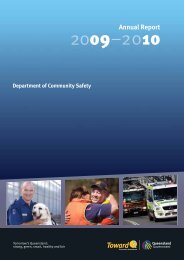Keeping it real - the Queensland VET Development Centre
Keeping it real - the Queensland VET Development Centre
Keeping it real - the Queensland VET Development Centre
- No tags were found...
You also want an ePaper? Increase the reach of your titles
YUMPU automatically turns print PDFs into web optimized ePapers that Google loves.
It was suggested that planning appropriate and meaningful work opportun<strong>it</strong>ies for trainers shouldbe a collaborative process involving industry, RTO managers and trainers. Aud<strong>it</strong>ors recommendedan outcomes focus when planning activ<strong>it</strong>ies — thinking about how and why activ<strong>it</strong>ies contribute toindustry currency.Key Finding 14Industry placements need collaborative planning and support from industry, RTO managementand trainers to provide meaningful opportun<strong>it</strong>ies for trainers to maintain and improve <strong>the</strong>irindustry skills and knowledge.Key Finding 15Applying an outcomes focus during planning provides greater clar<strong>it</strong>y and purpose to industryexperience activ<strong>it</strong>ies.• Lim<strong>it</strong>ed engagement w<strong>it</strong>h industryTrainers generally wanted more opportun<strong>it</strong>ies to engage w<strong>it</strong>h <strong>the</strong> industries of <strong>the</strong>ir vocationaltraining areas, seeing benef<strong>it</strong>s for <strong>the</strong>mselves, industry and <strong>the</strong>ir RTO. It was suggested that timespent in contact w<strong>it</strong>h employers should be as highly valued by <strong>the</strong> RTO as delivery hours. There wassome difference in opinion about when engagement w<strong>it</strong>h industry and employers should occur.Some RTO managers and trainers viewed regular industry engagement as a core professional activ<strong>it</strong>ythat should be proactively undertaken at a time that best met <strong>the</strong> needs of <strong>the</strong> industry. Sometrainers who were not proactively engaged w<strong>it</strong>h industry indicated <strong>the</strong>y expect dedicated time to dothis. Some TAFE managers argued that non-contact hours could be used for industry engagement.Some RTOs have established industry reference groups to improve links w<strong>it</strong>h industry. Participationin <strong>the</strong>se groups may help trainers to develop a closer relationship w<strong>it</strong>h industry. However, <strong>the</strong>number of RTO staff who can participate in <strong>the</strong>se groups is lim<strong>it</strong>ed.• Expectations of RTO managers that trainers would take on part-time industry employmentFeedback from trainers indicated a growing expectation from RTO managers that trainers will workpart-time regularly in industry - often on top of a full-time training load. Trainers reported finding <strong>it</strong>difficult to balance <strong>the</strong>se expectations w<strong>it</strong>h o<strong>the</strong>r life and family comm<strong>it</strong>ments.A number of <strong>VET</strong> stakeholders thought that concurrent employment as part-time trainers and parttimeindustry employees would be an ideal way for trainers to maintain industry currency. This isconsistent w<strong>it</strong>h <strong>the</strong> approach recommended in <strong>the</strong> OECD Learning For Jobs report.• Att<strong>it</strong>udes that undervalue <strong>the</strong> importance of industry currencySome respondents thought that when trainers identify more as an educational professional than anindustry trainer <strong>the</strong> importance of maintaining industry currency diminishes.A few respondents reported that colleagues were not maintaining <strong>the</strong>ir industry currency. Somethought this was because <strong>the</strong>ir colleagues did not value maintaining current industry knowledge andskills. O<strong>the</strong>rs thought <strong>it</strong> was because <strong>the</strong>ir colleagues were so removed from <strong>the</strong>ir industry <strong>the</strong>y wereunaware that industry practice had changed.Barriers for teachers in schoolsTeachers in schools experience a unique set of issues in maintaining <strong>the</strong>ir industry currency. Teachershave to manage <strong>the</strong> different requirements of <strong>VET</strong> competencies, <strong>Queensland</strong> Certificate of Educationand <strong>Queensland</strong> Studies Author<strong>it</strong>y subjects. Senior school officials may not understand <strong>the</strong> <strong>VET</strong> sectorand <strong>it</strong>s unique requirements, particularly related to industry experience and industry currency.Industry Currency of Trainers in <strong>Queensland</strong>15


